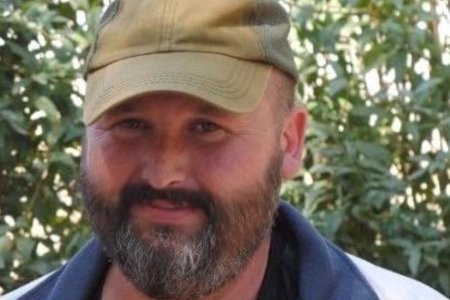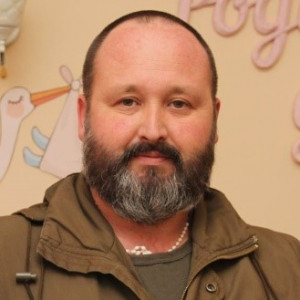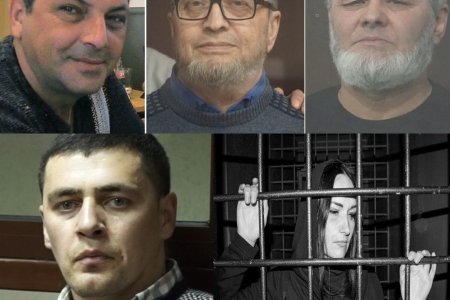
Russian revenge knows no limits when it comes to Ukrainian political prisoners persecuted because of their opposition to Russia’s invasion and occupation of Crimea. Ivan Yatskin has become the latest victim of repression to learn by telephone of his mother’s death after years of being denied any possibility of seeing her. Nor does the brutality end there, with Ivan’s wife, Gulnara Kadyrova and their three small children unable to make the arduous and prohibitively expensive journey to Kemerovo, in Russia where her husband is imprisoned four thousand kilometres from Crimea. Nor can the family afford the services of a lawyer to appeal against the brazen violation of Yatskin’s most fundamental rights.
The Crimean Tatar Resource Centre [CTRC] reported on 2 July that Yatskin had been informed of his mother’s death, while being prevented from attending her funeral. Such final brutality is not purely linked with physical distance since Russia has prevented many Crimean Tatar and other Ukrainian political prisoners from attending the funerals of their closest relatives even when they were still held in detention in occupied Crimea, without conviction or sentence.
Yatskin is now held in No. 5 prison colony in Kemero, with that transfer having made it even more difficult for his family to visit him. Gulnara and the children were able to see Ivan in 2024, but the journey even then was gruelling because of the huge distance and the appalling conditions. There is no realistic possibility of doing so again, either this year or in the foreseeable future.
While a private lawyer is currently visiting Yatskin several times a year, mainly to ensure that the prison administration are, at least, formally observing prison regulations, his family cannot afford to employ a lawyer to provide full defence of his rights. While appeals against particular forms of ill-treatment, refusal to provide medical care, or against his imprisonment so far from his family and home, are certainly important, they are very seldom at all successful, at least where Ukrainian political prisoners are concerned.
Yatskin’s health has long been a cause for concern, and the terrible food and conditions in the prison colony have caused further deterioration, with his teeth now crumbling and the problems he earlier experienced with one leg now on both. As reported, Yatskin had suffered chronic problems of the circulatory system even before his arrest in 2019 and had undergone a number of operations. He has since been consistently refused proper treatment with prison staff repeatedly blocking his wife’s efforts to send the medication and bandages needed to ensure that the sores on his legs from vascular ulcers did not become infected. It seems he was recently hospitalized but was only injected with antibiotics and then discharged. His family have appealed to the prison authorities so that, at least, the issue with vascular ulcers does not get worse, but say that the medical care in No 5 remains at best partial and ultimately inadequate. They are forced to send all medication that he needs from Crimea.
Ivan Yatskin (b. 22.10.1978) was one of at least four Ukrainians who were arrested in occupied Crimea in the second half of 2019, after the Kremlin was forced to release 35 Ukrainian political prisoners in exchange for Volodymyr Tsemakh, a vital witness able to provide highly incriminating information to the Dutch prosecutor about the downing, by a Russian Buk missile of Malaysian airliner MH17 on 17 July 2014.
Armed FSB officers, many in masks, burst into the family’s home in the village of Volkovo on 16 October 2019 and took Yatskin away. Gulnara was then expecting the couple’s third child, their first daughter. It was the eve of Ivan’s mother’s birthday, and Taisa Yatskina was expecting them to visit that day. Gulnara later recounted how one of the hardest moments for her was arriving at her mother-in-law’s home and seeing Taisia Yatskina come out to greet them smiling, and have to tell her that Ivan had been arrested.
He was charged with ‘state treason in the form of spying’, with this making it possible to impose total secrecy over the entire ‘trial’. Yatskin was fortunate to be represented by Nikolai Polozov, a lawyer who has represented many Crimean Tatar and other Ukrainian political prisoners, however even Polozov was forced, on pain of criminal prosecution, to sign a non-disclosure agreement.
From the initial arrest warrant, the FSB appeared to be claiming that Yatskin had, from 14 February to 30 March 2018, “gathered personal data of officers of the police search and operations office in Crimea.” He was supposed to have passed this “personal date, constituting a state secret” to Ukraine’s Security Service in 2016.
In declaring Yatskin a political prisoner, the Memorial Human Rights Centre suggested that Yatskin might, at some earlier stage, have served in the Ukrainian police force and could well have known former Ukrainian offices who later breached their oath and joined the Russian police. Any such information, however, would have been from before Russia’s invasion and annexation of Crimea, and would have pertained to activities under Ukrainian law. Memorial noted that Yatskin’s persecution was part of the constant anti-Ukrainian campaign run since the end of 2013 in the state media and seen in the statements of high-ranking officials in Russia. “One of the components of this campaign has been the initiating of criminal prosecutions against citizens publicly expressing a position on events in Ukraine that diverges from the official stand and directly against Ukrainians”. These include a large number of cases over so-called terrorism or spying.
Yatskin was moved almost immediately, and in total secrecy, to Lefortovo SIZO [remand prison] in Moscow. Gulnara saw her husband for the first time after his arrest on 21 May 2021 when the Russian occupation ‘Crimean High Court’ sentenced him to 11 years in a harsh regime prison colony. That sentence was, on 16 September 2021, upheld by Russia’s Third Court of Appeal.
Please write to Ivan Yatskin!
The letters tell him, and Moscow, that he is not forgotten and that Russia’s treatment of him is under scrutiny. Letters need to be handwritten and in Russian. Please avoid any political subjects, mention of the war or reference to the charges against him. If possible, enclose an envelope and some thin paper, as well as your return address.
If Russian is a problem, the following would be fine, maybe with a photo or card. The envelope can be written in Russian or English letters, but do add Ivan’s year of birth (as below).
Sample letter
Здравствуйте, Иван!
Желаю Вам здоровья и терпения, и очень надеюсь на скорое освобождение. Простите, что мало пишу – мне трудно писать по-русски, но мы все о Вас помним.
[Dear Ivan, I wish you good health, courage and patience and hope that you will soon be released. I’m sorry that this letter is short – it’s hard for me to write in Russian., but you are not forgotten. ]
Address
650004, Россия,, г. Кемерово, ул. Буденного, 48, ФКУ ИК-5 ГУФСИН России по Кемеровской области,
Яцкину Ивану Григорьевичу, 1978 г. р.
[or in English: 650004 Russia, Kemerovo, Budennogo St, No. 48, Prison Colony No. 5
Yatskin, Ivan Grigorevich, b. 1978



